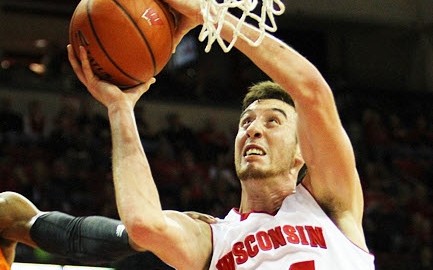Four Leadership Characteristics of Frank Kaminsky

Frank Kaminsky just completed a great year for the University of Wisconsin’s basketball team, culminating with the most prestigious award college basketball gives – The Naismith Award for the college-player-of-the-year.
Throughout the year, his play demonstrated four characteristics that leaders may want to consider.
 Unselfishness. Frank was willing to pass up shots or go one-on-one to keep the offense moving. The offense was designed to take the ball from one side of the floor to the other side and Frank did just that. The most important concept in offensive basketball could very well be team shot selection and Frank only took shots that were within the confines of the offense. How important is it for leaders to exhibit unselfishness?
Unselfishness. Frank was willing to pass up shots or go one-on-one to keep the offense moving. The offense was designed to take the ball from one side of the floor to the other side and Frank did just that. The most important concept in offensive basketball could very well be team shot selection and Frank only took shots that were within the confines of the offense. How important is it for leaders to exhibit unselfishness?
Grunt work. Frank consistently did three things that are not prominent among basketball statistics, but three things that lead to winning. He rebounded; he blocked shots; and he often helped on defense when a teammate was beaten to the basket. George Ravelling , who wrote considerably on rebounding, said the most under-rated statistic that leads to winning is rebounding. When a team can get a second shot on offense and limit their opponent to one shot on defense, they most likely will win. Blocking shots and making opponents change their shots often lead to fast break basketball. Defensive help is one of the cornerstones of great team defense. Are leaders willing to do the grunt work, the work that often goes unnoticed and unappreciated?
Intelligence. There is no one way to teach successful basketball. Some teams run; some teams play half-court basketball; some teams play man-to-man defense; some teams play zone. And the list goes on. Regardless of how a coach decides to play, his teaching will result in a system of play. It is then of paramount importance that every player knows the system and buys into the system and when they do, you have a successful team. Frank knew Bo Ryan’s system and completely bought into it. Every business and most organizations have a mission. Leaders must have the intelligence to understand the mission and the ability to teach it.
Loyalty. Frank left money on the table. After his outstanding junior year, he became an NBA draftee candidate. He could have run with the money, but he elected to return for his senior year. How many collegiate players would have made that decision, given the fact that many players opt for the NBA only to not get drafted? Frank, on the other hand, was a sure draftee. Whatever all his reasons may have been to return, the one thing he did show was loyalty to his teammates. How many leaders would leave money on the table and stay with their business or would they run to the money?
Unselfishness, grunt work, intelligence, and loyalty do make for a quality leader.
